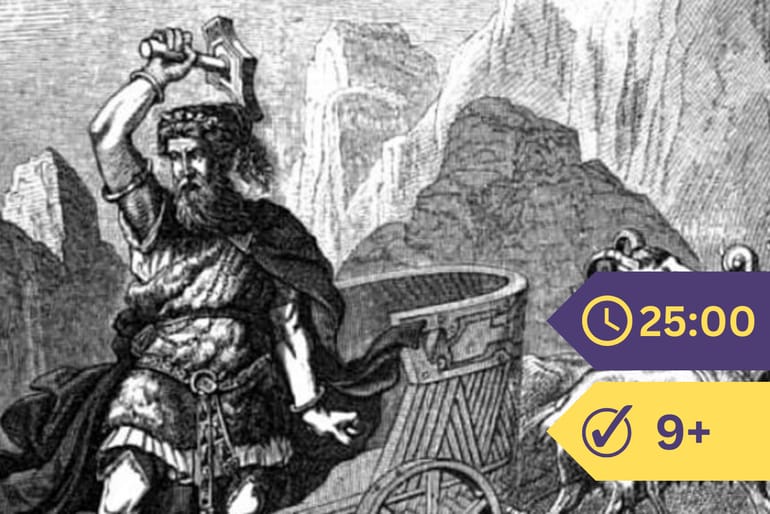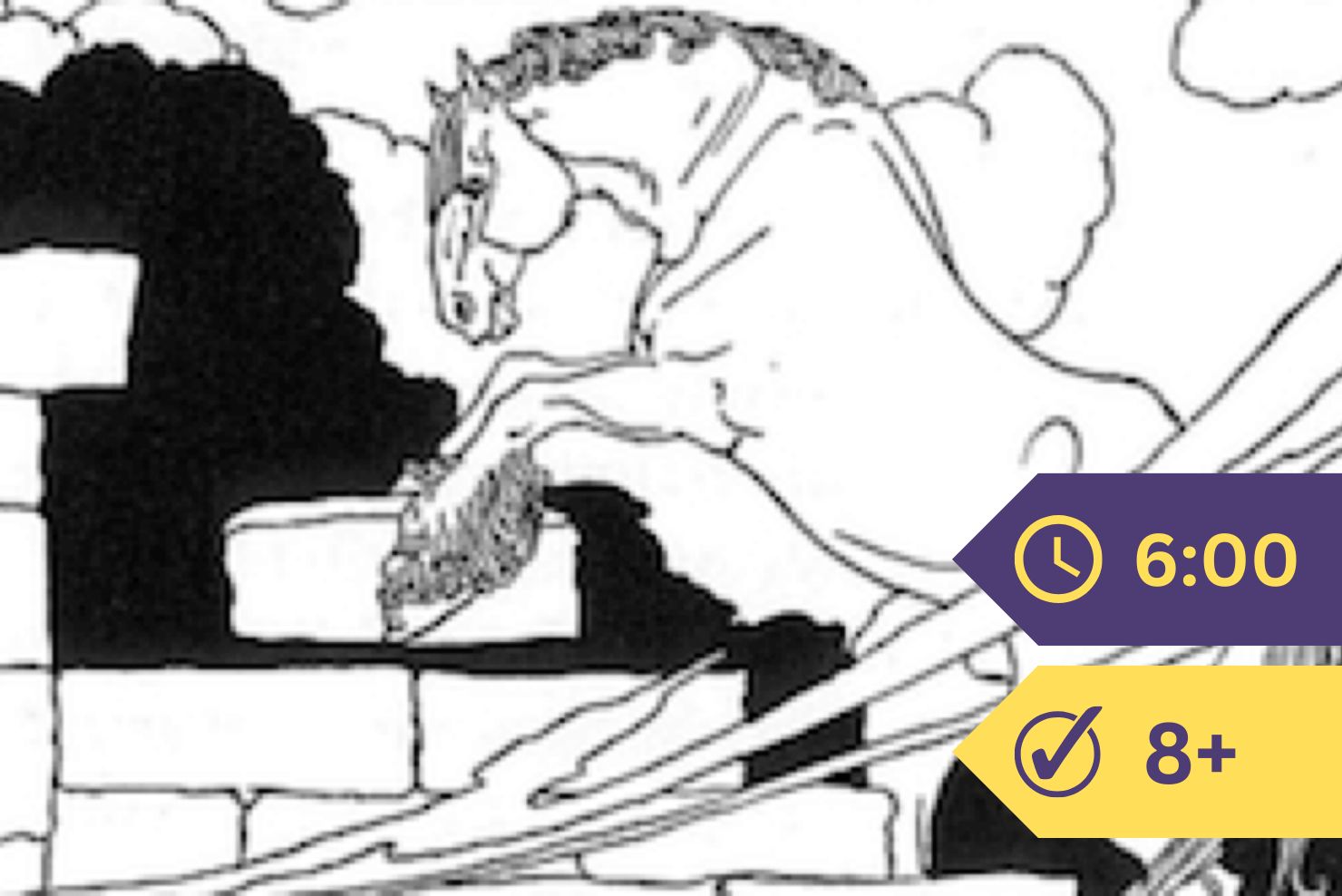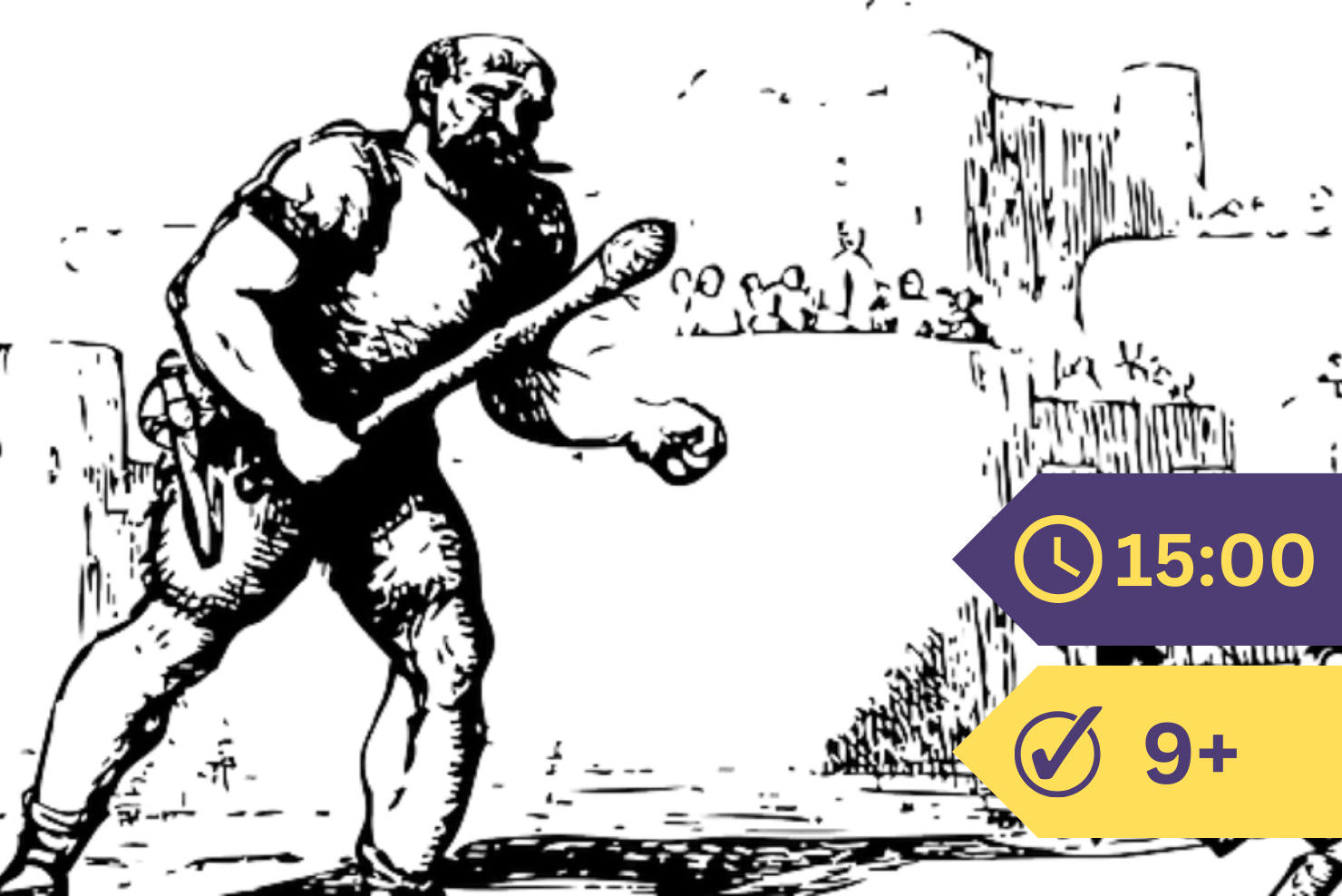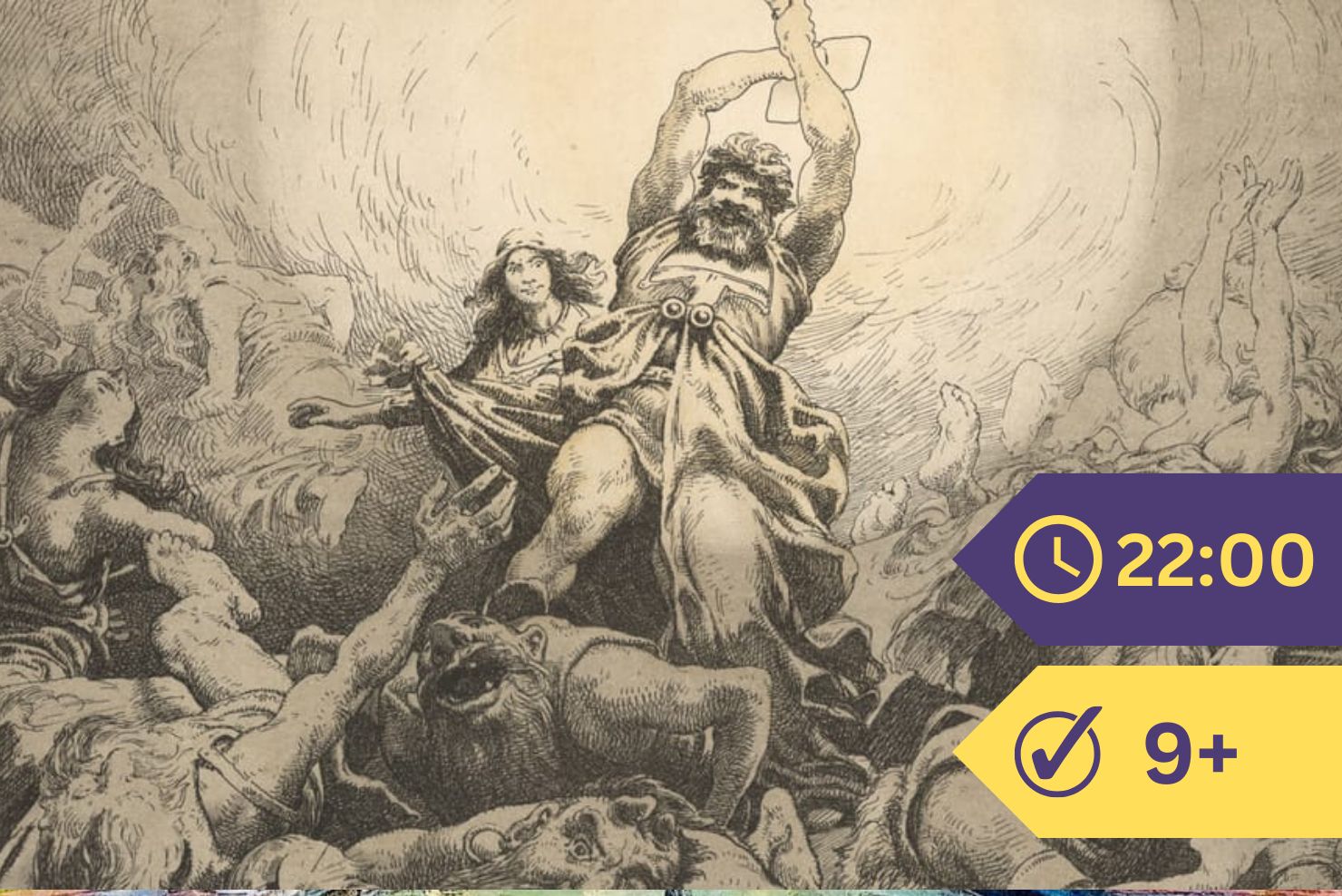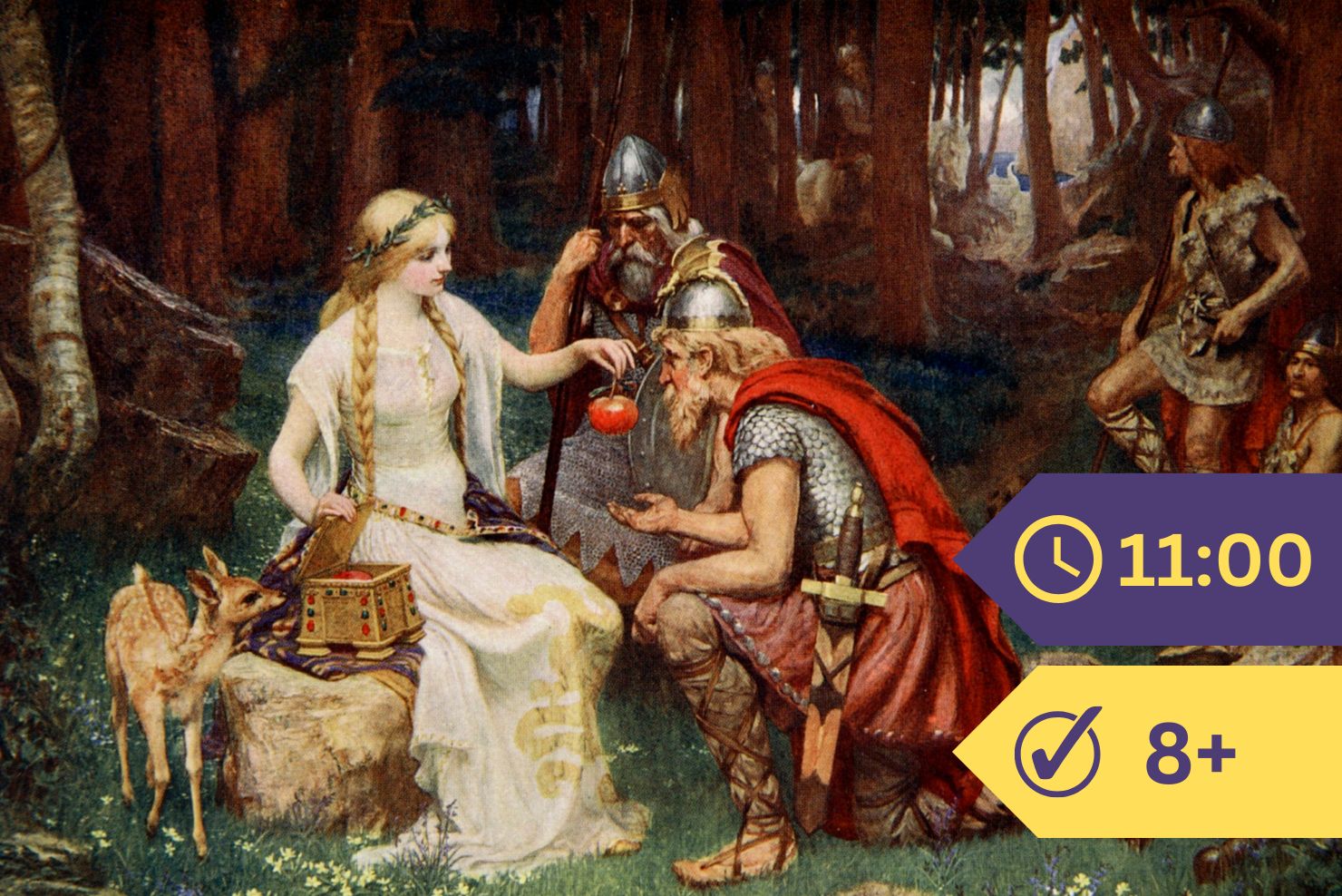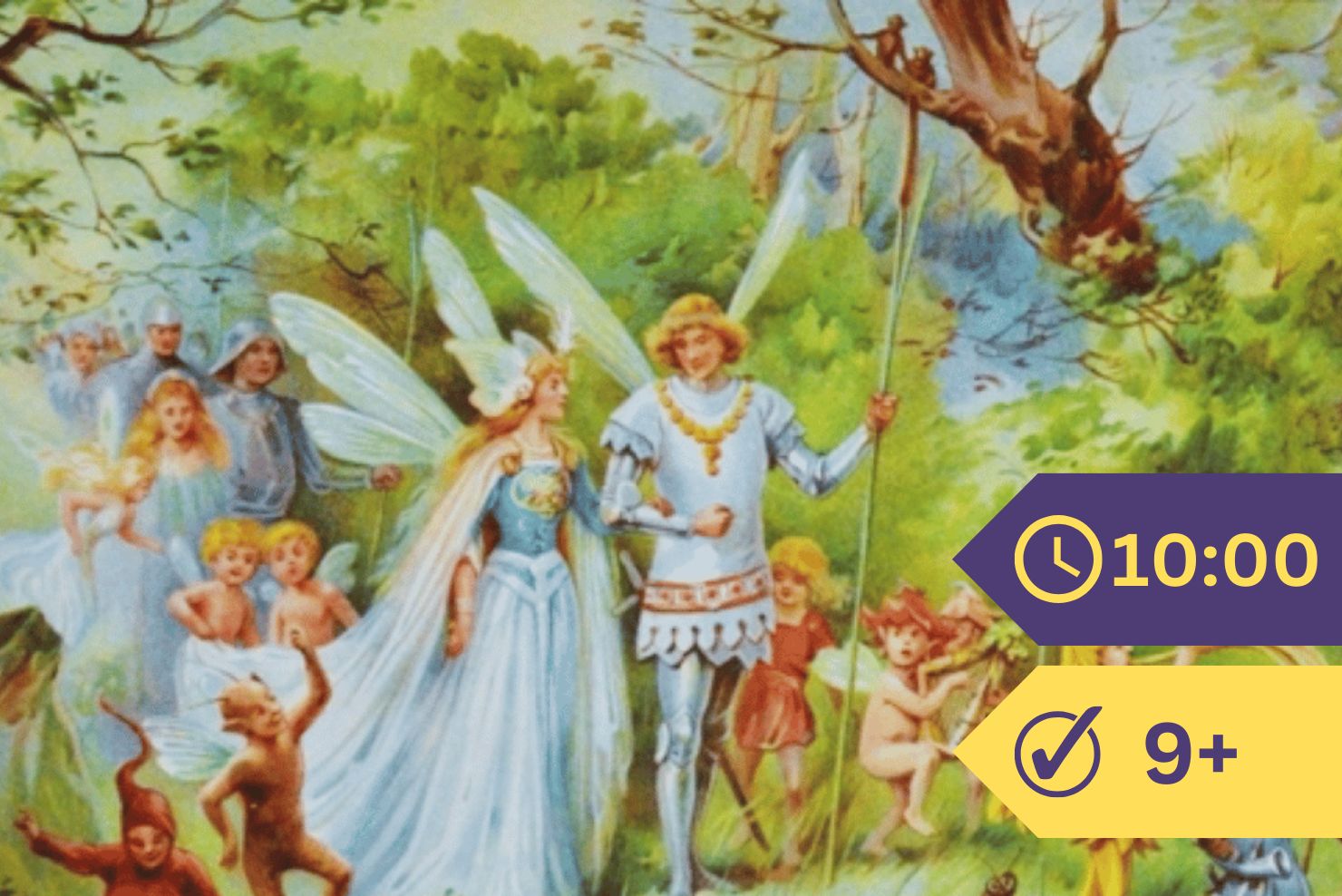On a certain day, Asa Thor and Loki set out from Asgard on a journey to Jotunheim. They traveled in Thor’s war chariot, pulled by two milk-white goats. It was a somewhat bulky iron wagon, and the wheels made a rumbling sound as it moved, which sometimes frightened and shook the ladies of Asgard; but Thor enjoyed it, he found the sound sweeter than any music, and was never happier than when he traveled from one place to another in it.
They traveled all day and in the evening they arrived at the house of a countryman. It was a poor, lonely place; but Thor got off his wagon and decided to spend the night there. However, the countryman had no food in the house to give these travelers; and Thor, who liked to feast and wanted everyone to feast with him, was obliged to kill his own two goats and serve them as dinner. He invited the countryman and his wife and children to come and eat with him; but before they began to eat, he made them one request.
“Do not break or throw away the bones of the goats you are about to eat in any way,” he said.
“I wonder why,” said the countryman’s son, Thialfi, to his sister Roska. Roska could not think of a reason, and by chance Thialfi got a very nice bone with some marrow in it. “It can’t hurt if I just break this one,” he said to himself; “it would be such a pity to lose the marrow”; and when Asa Thor looked the other way, he slyly broke the bone in two, sucked the marrow out, and threw the pieces into the goat skins where Thor had said that all the bones should be collected. I don’t know if Thialfi was worried about what he had done at night; but in the morning, he discovered the reason for Asa Thor’s command and learned a lesson about ‘wondering why’ that he never forgot for the rest of his life.
As soon as Asa Thor got up in the morning, he took his hammer, Mjolnir, in his hand and held it over the goat skins lying on the ground while whispering runes. They were dead skins with dry bones on them when he began to speak; but when he said the last word, Thialfi, who was watching curiously, saw two living goats spring up and run to the wagon, as fresh and healthy as when they brought the wagon to the door, Thialfi hoped. But no; one of the goats limped a little with its hind leg, and Asa Thor saw it. His forehead became dark as he looked, and for a minute, Thialfi thought he would run far, far into the forest and never come back; but one more look at Asa Thor’s face, no matter how angry it was, made him change his mind. He thought of something better than running away. He came forward, threw himself at the feet of the Asa, confessing what he had done, and begged for forgiveness for his disobedience. Thor listened and the dissatisfied look disappeared from his face.
“You made a mistake, Thialfi,” he said as he lifted him up; “but you bravely admitted it, and therefore, instead of punishing you, I will take you on my journey and teach you the lesson of obedience to the Aesir that you need.”
Roska chose to go with her brother, and from that day on, Thor had two loyal servants who followed him everywhere.
They left the cart and the goats behind, but Thor continued his journey to the end of Manheim with Loki and his two new followers, across the sea, and then further and further into the strange, barren, misty land of Jötunheim. Sometimes they crossed large mountains, sometimes they had to make their way between torn and rugged rocks that often, through the mist, appeared to take the forms of men, and once they spent a whole day crossing a dense and tangled forest.
On the evening of that day, very tired, they were pleased to have come to a spacious hall, the door of which, as wide as the house itself, stood wide open.
“We can stay here very comfortably,” said Thor, and they went inside and looked around.
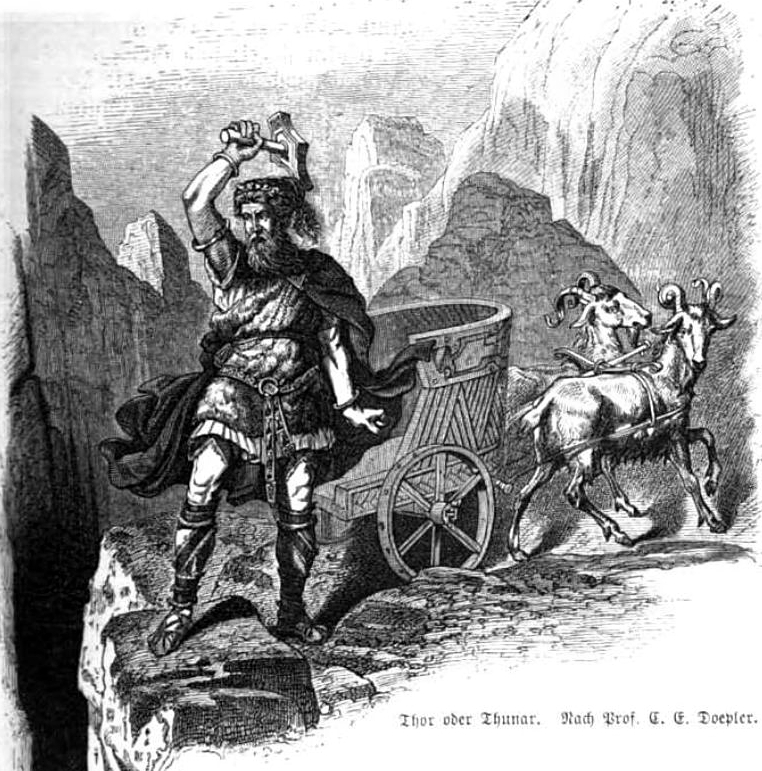
The house seemed to be completely empty; there was a wide hall and five smaller rooms leading off it. However, they were too tired to examine it carefully, and since no occupants appeared, they ate their supper in the hall and lay down to sleep. But they had not rested long when they were disturbed by strange sounds, groaning, murmuring, and snorting louder than any animal they had ever seen in their lives could make. Gradually the house began to shake, and it seemed as if the earth itself was trembling. Thor quickly jumped up and ran to the open door, but although he looked seriously into the starlit forest, there was no enemy to be seen anywhere. After feeling around for a while, Loki and Thialfi found a sheltered room on the right where they thought they could safely finish their night’s rest; but Thor, with Mjölnir in his hand, guarded the door of the house all night. As soon as day broke, he went into the forest, and there, lying on the ground close to the house, he saw a strange, uncivilized, gigantic figure of a man, from whose nostrils a breath came that made the trees sway to their tops. There was no longer any need to wonder what the disturbing sounds had been.
Thor walked fearlessly toward this strange monster to get a better look at him, but at the sound of his footsteps, the giant form slowly rose, stood at an immense height, and looked down at Thor with two large misty eyes, like blue mountain lakes.
“Who are you?” said Thor, standing on tiptoe and stretching his neck to look up; “and why are you making so much noise that your neighbors can’t sleep?”
“My name is Skrymir,” said the giant sternly; “I need not ask yours. You are the little Asa Thor of Asgard; what have you done with my glove?”
As he spoke, he stooped and picked up the hall where Thor and his companions had spent the night, which in reality was nothing more than his glove; the room where Loki and Thialfi had slept was the thumb.
Thor rubbed his eyes and felt as though he were dreaming. Shaking himself awake, he lifted Mjölnir in his hand, and as he tried to keep his eyes fixed on the face of the giant, which always seemed to be changing, he said: “It’s time you knew, Skrymir, that I have come to Jötunheim to fight and defeat such evil giants as you, and no matter how small you think me, I am ready to try my strength against yours.”
“Then try it,” said the giant.
And Thor, without saying another word, threw Mjölnir at his head.
“Ah! Ah!” said the giant; “has a leaf touched me?”
Once again Thor grasped Mjolnir, which always returned to his hand no matter how far he threw it, and hurled it with all his might.
The giant placed his hand on his forehead. “I think,” he said, “that an acorn must have fallen on my head.”
A third time Thor struck, the heaviest blow ever to come from the hand of an Asa; but this time the giant laughed out loud.
“There must be a bird in that tree,” he said, “that dropped a feather on my face.”
Then, without paying any further attention to Thor, he swung an immense bag over his shoulder, turned his back and took a path leading out of the forest. After walking a distance, he looked back and said:
“Thor, let me give you some good advice before I go. When you come to Utgard, do not make too much of yourself. You think that I am a tall man, but there they are even taller; and you are a very small man. Return home and be content that you have learned something about yourself by your journey to Jotunheim.”
“Small or not, that I will never do,” called Asa Thor after the giant. “We shall meet again, and we shall either learn more together or teach each other something.”
The giant did not turn to answer, and Thor and his companions resumed their journey. Before the sun was very high in the sky, they emerged from the forest, and by midday they were on an extensive barren plain, where a great city stood, its walls of dark, rough stone so high that Thor had to bend his head well back to see the top of them. As they approached the entrance to this city, they found the gates closed and barred; but the space between the bars was so wide that Thor could easily pass through it, and his companions followed him. The streets of the city were somber and silent. They walked for a time without meeting anyone; but at last they came to a very high building, whose gates stood open.
“Let us go in and see what is going on here,” said Thor.
Crossing the threshold, they found themselves in an immense banqueting hall. A table stretched from one end to the other; stone thrones were set round the table, and on each throne sat a giant, each, as Thor looked round, seeming grimmer, colder, and more stony than the rest. One of them sat on an elevated chair and seemed to be the chief; so Thor went up to him and greeted him.
The giant chief cast a glance at him and said, in a casual way without rising, “It is, I think, a foolish habit to tease weary travelers with questions about their journey. I know without asking that you, little fellow, are Asa Thor. Perhaps, however, you are in reality bigger than you appear; and since it is the rule here that no one shall sit down to table until he has performed some great achievement, let us hear in what way you and your followers are famous, and how you choose to prove yourselves worthy to sit in the hall in the company of giants.”
At this speech Loki, who had cautiously entered the hall behind Thor, pushed forward.
“The achievement for which I am most famous,” he said, “is eating, and it is an achievement that I can now demonstrate. Put food before me and let me know if any of your giants can eat it faster than I.”
“The achievement of which you speak is nothing remarkable,” said the Utgard-king, “and there is one here who would gladly try his powers against yours. Let Logi,” he said to one of his followers, “come into the hall.”
A long, thin man with a yellow face entered, and a large piece of meat was placed in the center of the hall. Loki sat down on one side and Logi on the other, and they began to eat. The giants all turned their eyes to look at them, and within a few minutes they met in the middle of the piece of meat. It seemed at first as though they had both eaten exactly the same amount; but when it was examined, it turned out that Loki had indeed eaten all the meat, but Logi had also eaten the bones. Then the giants nodded their huge heads and declared that Loki had lost. King Utgard now turned to Thialfi and asked what he could do.
“I am considered the swiftest of foot among the youth of my own land,” answered Thialfi, “and I will, if you please, try a race with some one here.”
“You have chosen a noble sport,” said the king; “but you must be a good runner if you are to defeat him with whom I will match you.”
Then he called in a slim boy, Hugi, and the whole company left the hall. They went out through a gate opposite to that by which Thor had entered, and came out into an open space which formed a good racecourse. There they fixed the finish, and Thialfi and Hugi began to run.
Thialfi ran quickly–like a reindeer when it hears wolves howling behind it; but Hugi ran much faster than he. He turned and ran to meet Thialfi midway of the course when he had reached the goal.
“Try again, Thialfi,” cried the king; and Thialfi, who took his place again, flew over the course, his feet scarcely touching the ground–swift as an eagle when he swoops from his mountain crag upon his prey in the valley; but he was still far from the goal when Hugi reached it.
“You are certainly a good runner,” said the king; “but if you wish to win, you must do still better than this; but perhaps you will try it once more?”
The third time Thialfi was very much fatigued, and though he did his best, Hugi, who had reached the goal, turned and met him not far from the starting-point.
The giants looked at each other again and declared that no further trial was needed, for Thialfi was overcome.
Now it was Asa Thor’s turn, and the whole company looked eagerly at him, while the king of Utgard asked with what wondrous feat he distinguished himself.
“I will try a drinking bout with one of you,” said Thor shortly; for, to tell the truth, he cared little to do anything very dignified in the company in which he found himself.
King Utgard seemed satisfied with this choice, and when the giants had resumed their places in the hall, he ordered one of his servants to bring in his drinking-cup, the “cup of penance.” It was his custom to have his guests drink the cup at one draught when they had broken any one of the old laws of society.
“There!” he said, as he handed it to Thor, “we call it well drunk if any one empties it at a draught. Some take two; but the very small ones can manage it in three.”
Thor looked at the cup; it seemed to him long, but not so very large, and because he was thirsty, he put it to his lips and thought to dispose of it with one good, strong pull. He drank and set the cup down again; but instead of being empty, it was now so full that it could not be moved without danger of spilling.
“Ha! haha! You’re saving all your strength for the second pull, I see,” said Utgard as he looked into the cup. Without answering, Thor lifted the cup and drank with all his might until his breath was stuck; but when he set the cup down, the drink had only sunk a little bit from the rim.
“If you intend to do it three times,” said Utgard, “you’re really leaving yourself a very unfair share for the last time. Look at yourself, Thor; for if you can’t do better in other feats, we won’t think as much of you here as they say the Aesir in Asgard do.”
At this speech, Thor became angry, and grabbing the cup again, he drank for the third time, deeper and longer than he had done so far; but when he looked into the cup, he saw that only a very small portion of the contents had disappeared. Weary and disappointed, he set the cup down and said he would no longer try to empty it.
“It is quite clear,” said the king, looking around at the company, “that Asa Thor is not the kind of man we always supposed him to be.”
“No,” said Thor, “I am willing to try another feat, and you shall choose for yourselves what it shall be.”
“Well,” said the king, “there is a game that our children are used to playing. I dared not name it to Asa Thor; but now I am curious to see how you will do. It is only to lift my cat off the ground – really a childish amusement.”
As he spoke, a large, gray cat leaped into the hall, and Thor, stooping over, put his hand under it to lift it up. He tried it first gently; but gradually he put all his strength into it, pulling and exerting himself as he had never done before; but the utmost he could do was to lift one of the cat’s legs a little way from the ground.
“It is just as I thought,” said King Utgard, smiling around him; “but we are all willing to admit that the cat is large, and Thor but a small man.”
“However small you may think me,” cried Thor, “who is there that will dare to wrestle with me in my anger?”
“Honestly,” said the king, “I don’t think there is anyone here who would choose to wrestle with you; but if you must wrestle, I will bring in that old woman, Elli. She has in her time thrown down many a better man than Asa Thor has shown himself to be.”
The woman came. She was old, shriveled, and toothless, and Thor shrank from the thought of wrestling with her; but he had no choice. She threw her arms around him and pulled him to the ground, and the harder he tried to get loose, the firmer her grip became. They wrestled for a long time. Thor did bravely, but a strange feeling of weakness and weariness came over him, and at last he staggered and fell on one knee before her. At this sight all the giants laughed aloud, and Utgard came running up, requested the old woman to leave the hall, and proclaimed that the feats were at an end. None of his followers would contend with Asa Thor, he said. He then invited Thor and his companions to sit at table and spend the night with him as his guests. Thor, though feeling somewhat bewildered and crestfallen, accepted his invitation courteously and showed by his pleasant behavior throughout the evening that he knew how to bear defeat with good grace.
In the morning, when Thor and his companions left the city, the king accompanied them outside the gates. And Thor, who stared at him intently as he turned to bid him farewell, saw for the first time that he was the same Giant Skrymir whom he had met in the forest.
“Come now, Asa Thor,” said the giant with a strange kind of smile on his face, “tell me truly, before you go, how you think your journey has gone, and whether I was right in saying that you would meet better men than yourself in Jotunheim.”
“I confess freely,” answered Asa Thor, looking up without any shame on his face, “that I have but humbled myself, and it grieves me; for I know that in Jotunheim it will henceforth be said that I am a man of little worth.”
“Nay, nay,” cried the giant heartily. “Never would I have let you into my city if I had known what a heroic man you really are; and now that you are safely out of it, I will tell you the truth for once, Thor. All the time I have been deceiving you by my enchantments. When you met me in the forest and threw Mjolnir at my head, I should have been crushed by the weight of your blows if I had not skilfully placed a mountain between me and you, upon which the strokes of your hammer fell. In the same way I deceived you during the contests in which you took part last night. When Loki and Logi sat down to the piece of meat, Loki did indeed eat it all himself; but Logi is made of fire, and the fire consumed the bones and meat. Thialfi is the swiftest of all mortal runners; but the slim boy, Hugi, was made of my thought; and what speed can ever equal thought? So it was also in your own trials. When you took such a huge draught from the cup, you did not know what a great feat you were performing. The end of the cup reached to the ocean, and when you reach the coast, you will see how much water has gone and how much the deep sea has been lowered by your drinking. Henceforth men who see the tide ebb will call it the ebb or draught of Thor.
“Scarcely less wonderful was the skill you showed in the second trial. What seemed to you a cat was in reality the Midgard serpent, which circles the world. When we saw that you succeeded in moving it, we trembled, lest the foundations of the earth and sea should be shaken by your strength. You need not be ashamed, either, that you were overthrown by the old woman Elli, for she has grown old; and there has never been, nor ever will be, anyone whom she cannot lay low. We must now part, and you had better not come here again, or attempt anything else against my city; for I shall always defend it with fresh enchantments, and you will never be able to do anything against me.”
At these words, Thor lifted Mjolnir and was about to challenge the giant to a new contest; but before he could speak, Utgard disappeared from his sight; and when he turned to seek the city, he found that it too had vanished, and that he stood alone on a smooth, green, empty plain.
“What a fool I have been,” said Asa Thor aloud, “to let myself be deceived by a mountain giant!”
“Ah!” answered a voice from above. “I told you that you would learn to know yourself better during your journey to Jotunheim. It is the great use of travelling.”
Thor quickly turned around, thinking he saw Skrymir behind him; but after looking from all sides, he could see nothing but a high, cloud-covered mountain that he had noticed on the horizon, which seemed to have shifted to the edge of the plain.

